The copyright owner in Runt is seeking to enjoin director William Coakley from releasing a behind-the-scenes project about alleged on-set bullying and sexual harassment that it claims he fabricated.
In 2019, actor Cameron Boyce, star of Disney franchises Jesse and Descendants, died tragically following a sudden epileptic seizure. At the time of his death, the 20-year-old Boyce was working on what would prove to be his final film, the independent coming-of-age drama Runt. Now, four years later, a lawsuit, sordid and tragic in its own right, is playing out in federal court between Runt’s copyright owner, Wagging Tails Productions, and the film’s writer and director, William Coakley.
The dispute over Runt involves a bizarre series of dramatic accusations and threats that in many ways mirror the plot of the movie itself: Runt tells the story of a bullied high school student, played by Boyce, who seeks vengeance against his tormenters. The lawsuit accuses Coakley of fabricating claims of real-life abuse allegedly suffered by Boyce and others on the set of the film. Wagging Tails is now seeking an injunction to prevent Coakley from publishing materials—including a planned tell-all film—recounting his accusations.
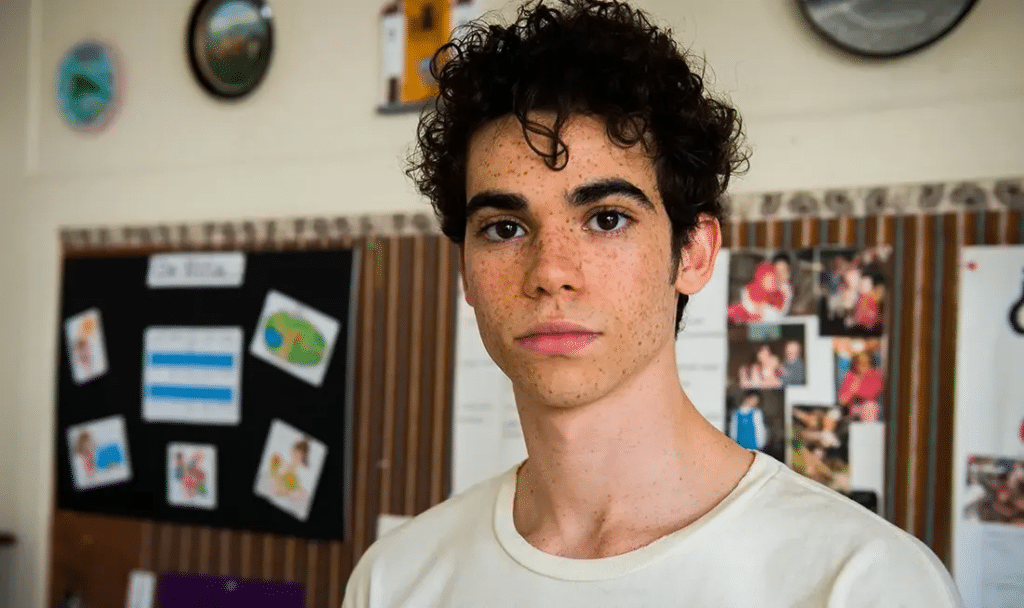
Wagging Tails claims that the threatened disclosures would violate Coakley’s confidentiality agreement. The company also asserts copyright ownership in two “director’s statements” written by Coakley about the alleged on-set bullying, as well as in Coakley’s planned derivative project about the making of Runt. Central District of California Judge John Kronstadt is scheduled to hear Wagging Tails’ injunction motion on March 20 in Los Angeles.
The case involves an interesting interplay between copyright law, entertainment contracts and the First Amendment. There’s a fair amount to unpack here, so let’s start with the facts, which I’ve compiled from my review of court files in both New York and California.
Coakley’s NDA and Certificate of Engagement
In 2018, before filming began on Runt, Coakley entered into a Confidentiality and Non-Disclosure Agreement (NDA) with the producer and financier of the film, Virtuoso 2, Inc. (Virtuoso). The NDA precludes Coakley from disclosing confidential information, “including without limitation, the identities of Producer’s ultimate principals and financiers and all tangible and non-tangible materials in which such information is contained.”

Coakley also signed a Certificate of Engagement which provided that his contributions to Runt would be treated as works made for hire under the U.S. Copyright Act or otherwise assigned to Virtuoso. Virtuoso later transferred its rights in Runt to Wagging Tails.

Allegations of On-Set Misconduct Emerge
Runt premiered at the Mammoth Film Festival in February 2020, where the film took home the festival’s Audience Award for Best Feature Film. But Coakley, who also won a directing award at the festival, wasn’t happy with the final product. He sought to remove his name from Runt‘s credits, claiming that the film was “unfinished and unethical.” The parties began discussions to resolve their dispute, at which point Coakley recounted what he said were multiple instances of bullying, harassment, and sexual misconduct that had occurred on the set of Runt.
Coakley’s allegations of misconduct were primarily directed at Harvey and Chrystanthi Berger, the parents of actress Nicole Berger, who played Runt’s female lead. Coakley claimed, among other things, that Boyce was forced to film a scene in which he had to kiss Nicole, who was 14 at the time, against Boyce’s objections that it was “morally wrong and would leave him open to allegations of sexual misconduct.” (Runt‘s script, co-written by Coakley, called for the kiss, but Coakley contends that Boyce didn’t know Nicole Berger was underage at the time she was cast.) Other allegations focused on harassment allegedly suffered by crew members on the set.
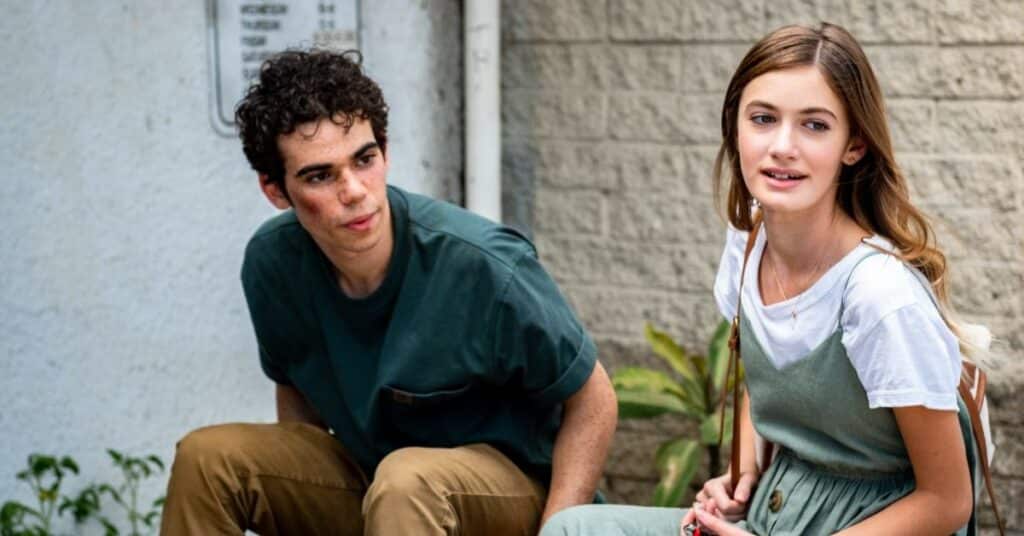
As the parties negotiated in mid-2021, Virtuoso says Coakley demanded $1,375,000 to fund a pilot for one of his other projects, allegedly threatening to take actions that would be “harmful to the commercial success of Runt” if his demand wasn’t met.
Virtuoso’s counsel then emailed Coakley to inform him that “unauthorized statements or disclosures about the Company, the film Runt or the film’s production activities” would violate his confidentiality obligations under the NDA:

As negotiations soured, Coakley sent the Bergers a barrage of emails, texts, and phone messages repeating his claims of a “hostile work environment” on the Runt film set and of a “coerced” on-screen kiss between Cameron Boyce and Nicole Berger. Coakley also threatened legal action against the Bergers, writing that “once this gets filed and goes public, I won’t even need to go further on the record . . . Media will be all over this.”
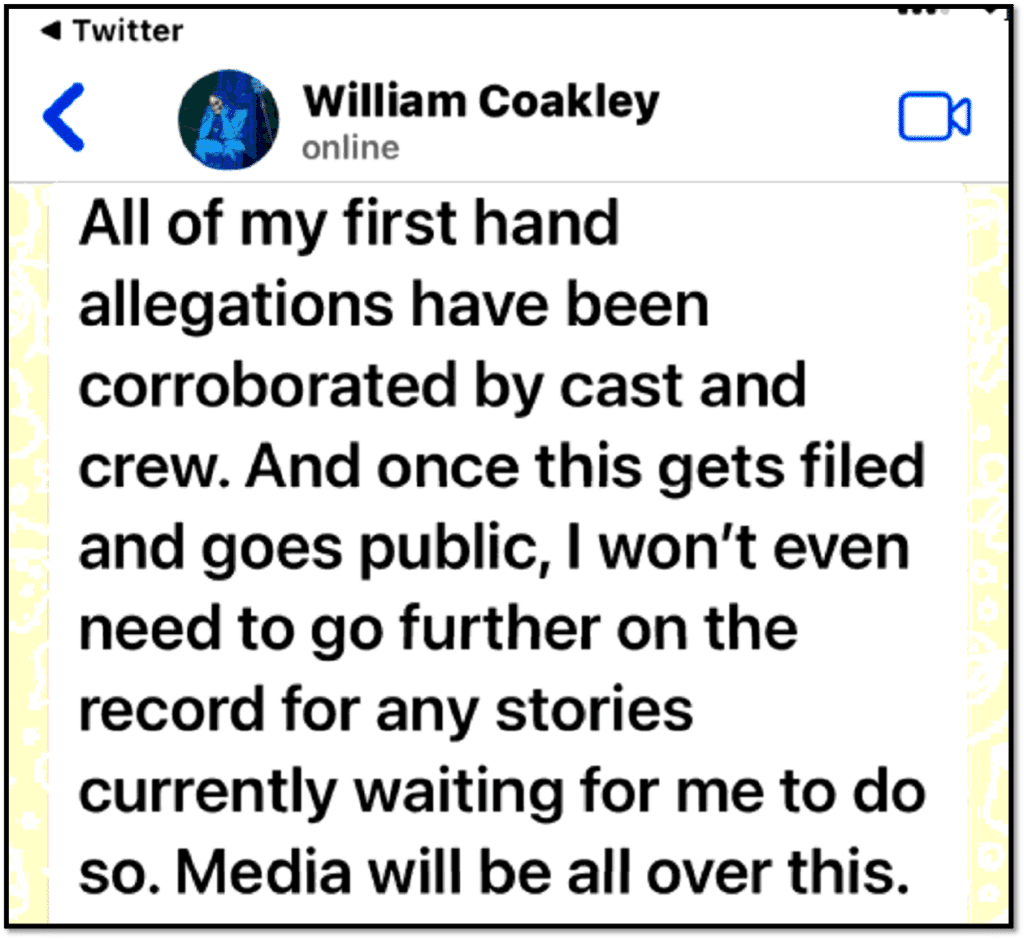
Referring to the Bergers’ daughter, Coakley wrote, “Nicole will be subpoenaed as this advances. That’s all going to be enshrined in public legal filings.”
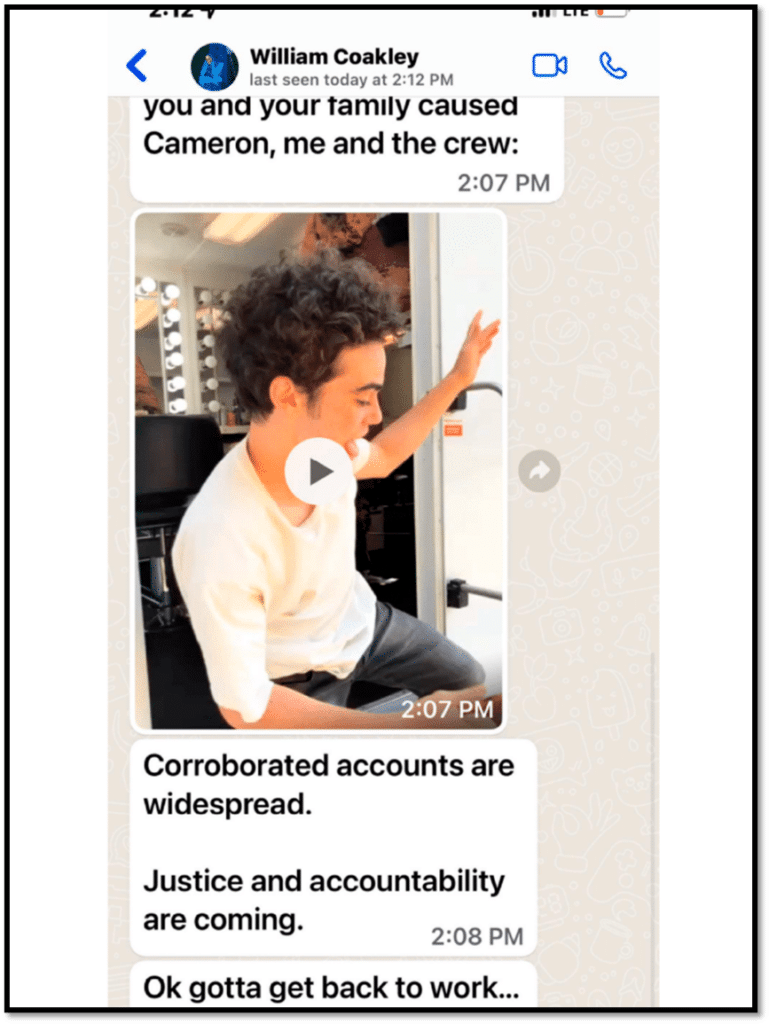
After Coakley’s alleged monetary demands were refused, Berger received an email from an unknown individual claiming to be a “friend” of Coakley’s, who threatened that a copy of Runt would be “leaked online” if Coakley’s pilot project wasn’t funded.
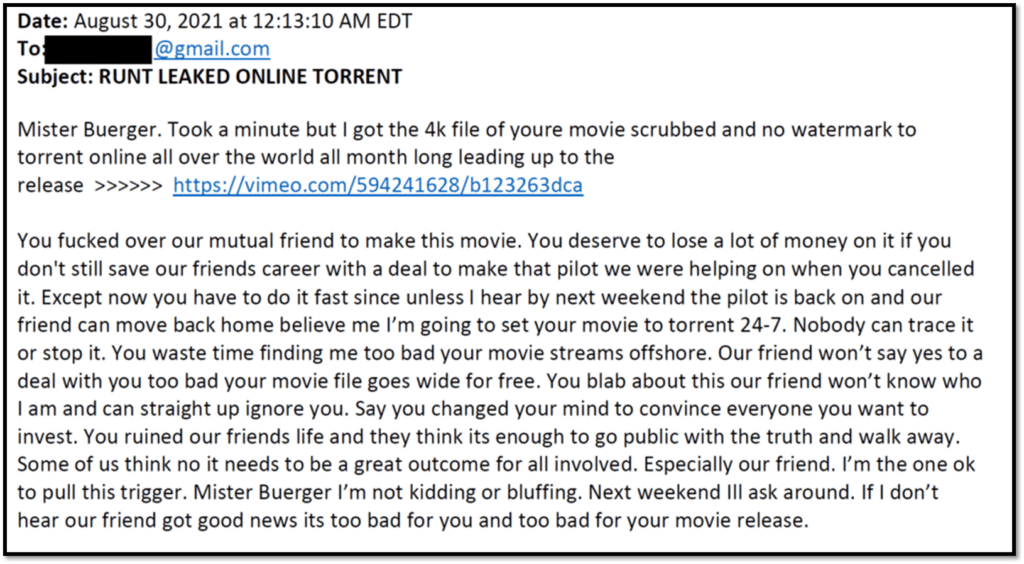
The parties’ negotiations ended in August 2021. Soon after, an unauthorized version of Runt was uploaded to YouTube and online torrent sites and allegedly downloaded more than 50,000 times. Wagging Tails believes that Coakley was involved based on the fact that the leaked version of the film differed from the final theatrical version and was identical to a version in Coakley’s possession.
In September 2021, Coakley issued his “Director’s Statement” on social media to coincide with Runt‘s official release. Coakley’s statement publicly disclosed his claims about “pervasive bullying, harassment [and] sexual harassment” on the set of the film, which then set off a campaign of online harassment directed towards the Bergers and their daughter Nicole, as well as their colleagues, schoolmates and teachers.
The New York Lawsuit
The first volley in the parties’ legal battle came in May 2022, when Coakley filed a pro se lawsuit in New York state court against the Bergers and Virtuoso. Coakley sought a judicial declaration that his NDA was unenforceable and couldn’t be used to prevent him from “disclosing the misrepresentations, bullying, sexual harassment, hostile work environment and sexual misconduct” that he claimed had taken place during the filming of Runt.
However, Coakley’s complaint wasn’t redacted to conceal the information in question, so the mere filing of the lawsuit effectively achieved his goal of disclosing the allegations of misconduct to the public. Coakley then voluntarily dropped his lawsuit following a motion to dismiss filed by the defendants, which included an affidavit from Cameron Boyce’s mother disputing Coakley’s claims that her son had been subject to harassment. Notwithstanding his dismissal, Coakley maintains the truth of his allegations, claiming that “the only reason I dropped the case was the addition of Mrs. Boyce’s shocking affidavit blatantly denying the humiliating treatment her son complained about during filming.”
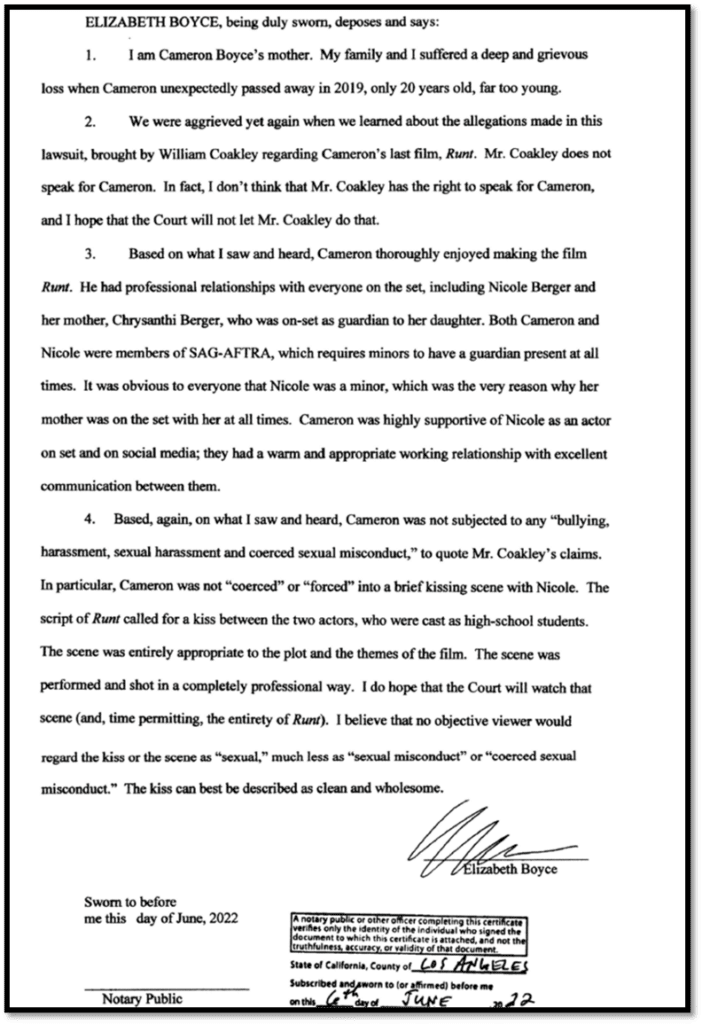
In October 2022, the New York court dismissed the lawsuit and issued a sanctions award against Coakley (read here), holding that his complaint’s publication of information potentially within the scope of the NDA, “although legally privileged against a suit for defamation or the like, amounts to improper self-help.” The court also noted that Coakley’s conduct in the months preceding the lawsuit suggested that he intended to “use the courts not as a means of resolving a genuine legal dispute,” but “rather as a tool to vent his anger.”
Among the voluminous exhibits included in the New York court file are graphic and disturbing communications from Coakley to the Bergers and one of the film’s producers detailing Coakley’s plan to “target[]” defendants’ daughter and encourage her to commit suicide.” Coakley also sent the Bergers mock-ups of movie posters referencing alleged misconduct that Coakley threatened to release on social media to “gauge public reaction.”
The Los Angeles Lawsuit
In December 2022, following the dismissal of his New York lawsuit, Coakley allegedly threatened to publish an updated Director’s Statement which would announce a new film project “inspired by the troubled making of Runt.” Coakley described his planned film as a “satire about the dark side of independent filmmaking, a real opportunity to turn that negative experience into a positive.”
Coakley’s threats prompted Wagging Tails—successor to Virtuoso and affiliated with Harvey Berger—to file its breach of contract and copyright infringement lawsuit against Coakley in federal court in Los Angeles. Wagging Tails’ complaint (read here) seeks, among other things, an injunction to prevent Coakley from breaching his NDA and copyright damages based on the leaked online release of Runt.
The plaintiff is also asking the court to enjoin Coakley’s Director’s Statements and nascent “making of Runt” film project, claiming that when Coakley sold Runt, he also sold the copyright to any of his future works related to Runt as well. Wagging Tails contends that these materials are “unauthorized and infringing derivative works” based on its motion picture.
Coakley hasn’t made an appearance in the lawsuit, so in addition to its preliminary injunction motion, Wagging Tails is seeking a default judgment and permanent injunction against him. On February 21, Judge Kronstadt denied Wagging Tails’ application for a temporary restraining order (read here) to prevent Coakley from releasing the threatened materials in advance of a ruling on the plaintiff’s motions for default judgment and injunction, which are scheduled to be heard by the court on March 20.
Using Copyright to Silence Speech
At the risk of stating the obvious, I have no knowledge of whether the bullying and sexual harassment alleged by Coakley in fact occurred, or if, as Wagging Tails contends, the claims were entirely fabricated by Coakley in order to exact revenge against Runt‘s producers and financiers. If Coakley is making all of this up, the desire to clamp down on Coakley’s disclosures by any legal means necessary is understandable. That said, it seems pretty clear that Wagging Tails is trying to use its copyright in Runt to suppress the public dissemination of misconduct allegations, not to vindicate its economic interests in the film.
Professor Cathay Smith uses the term “copyright silencing” to describe situations in which “owners assert copyrights to silence criticism or suppress facts instead of to protect copyright owners’ legitimate interests in their works.” Professor Smith considers silencing to be a form of “copyright weaponization,” which, despite its somewhat loaded name, simply refers to the use of copyright law to vindicate non-copyright interests.
I’ve written before about copyright weaponization in the context of an infringement lawsuit filed by Rachel Dolezal, the woman who lied for years about her race. That case presented an example of copyright used to erase history (in Dolezal’s case, a photo of her standing next to a man she had falsely claimed was her father). Other, perhaps more sympathetic, examples include attempts to protect one’s privacy in personal or intimate information. In one notable case, Balsley v. LFP, Inc., a TV news anchor who participated in a wet t-shirt contest acquired the copyright in pictures taken at the event in order to stop further dissemination of the photos by Hustler magazine. The Sixth Circuit ruled in Balsley’s favor, rejecting Hustler‘s fair use defense.
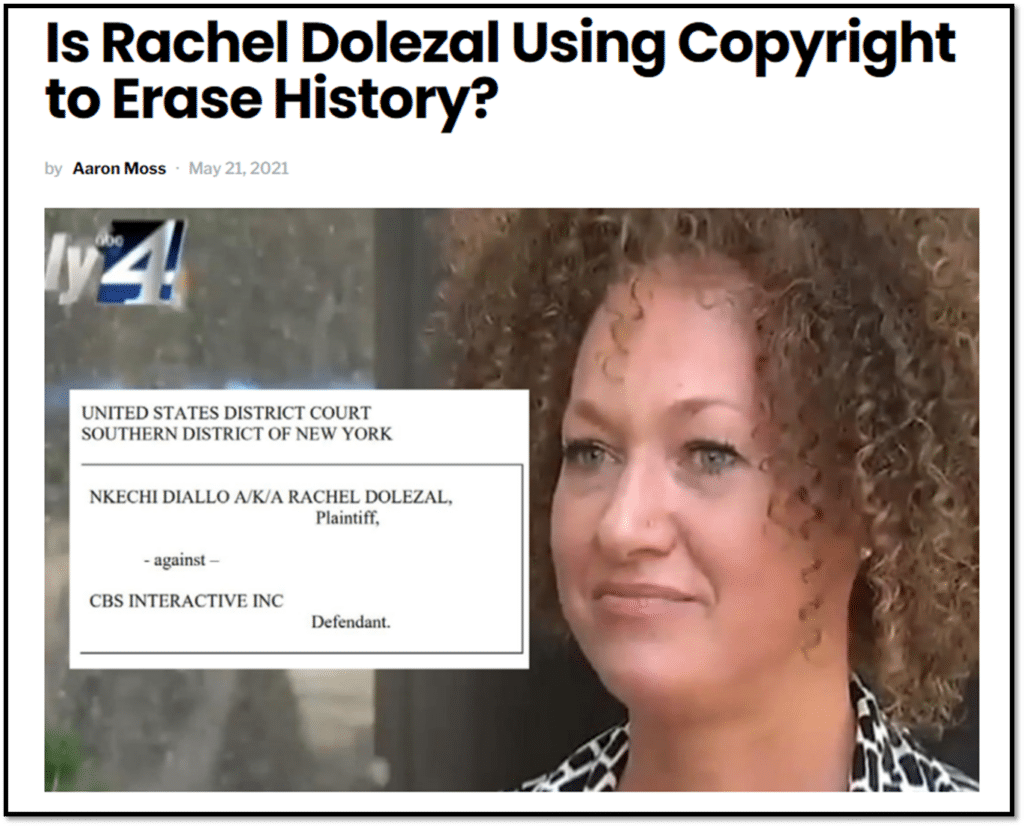
In one particularly egregious case of copyright weaponization described by Professor Smith, Harvey Weinstein’s legal team allegedly threatened journalist Ronan Farrow with copyright infringement to try to stop him from publishing information about Weinstein’s sexual misconduct. These efforts weren’t designed to protect any market or financial interest in Farrow’s materials, but to silence Weinstein’s victims and suppress Farrow’s disclosure of Weinstein’s misconduct.
Copyright silencing, while not necessarily unlawful, may color the lens by which a judge views a particular case. Along with the idea/expression dichotomy (copyright only protects creative expression, not underlying facts), the fair use doctrine provides what Justice Ginsburg once called a “built-in free speech accommodation.” While one could argue that the use of copyright law to vindicate privacy or reputational interests is appropriate in certain cases (revenge porn is an example that comes to mind), the justifications for asserting copyright in order to silence criticism, bury facts or suppress the public dissemination of information appear less noble.
Of course, it’s often difficult to discern the motivation of copyright owners. In the Runt case, it’s unclear whether Wagging Tails is primarily concerned with a desire to protect the privacy interests of innocent individuals against fabricated accusations or to silence legitimate investigation or criticism. While a court would likely be more sympathetic to the former purpose than the latter, neither is particularly geared toward any interest copyright law was designed to protect.
Analyzing Wagging Tails’ Claims
Putting aside the normative question of whether courts should allow copyright law to suppress speech, as a purely legal matter, most of Wagging Tails’ copyright arguments strike me as pretty weak. The strongest claim is for damages based on the unauthorized online streaming of Runt, assuming Wagging Tails is able to establish Coakley’s involvement. But the much more interesting question is whether Wagging Tails can establish copyright ownership in materials recounting Coakley’s accusations and then use that ownership to leverage an injunction.
Injunctions Prohibiting Speech Are Highly Disfavored
As a general proposition, injunctions prohibiting the disclosure of factual information are disfavored. Based on its denial of Wagging Tails’ application for temporary restraining order, the court appears hesitant to even issue a narrow injunction preventing Coakley from disclosing “the identities of Producer’s ultimate principals and financiers,” based on a lack of irreparable harm to Wagging Tails, who’s the only party to the motion.
It’s highly unlikely that the court would rely on the parties’ NDA to issue an even broader injunction prohibiting Coakley from discussing any aspect of Runt (including alleged on-set harassment), whether in connection with press statements, a new film project or otherwise. The NDA looks to be geared primarily toward information disclosed in connection with the funding of the film. A prohibition on disclosing workplace harassment presumably wasn’t reasonably contemplated by Coakley when he entered the agreement, and California public policy favors the disclosure of misconduct allegations.
An injunction based on the NDA will also run up against high hurdles under the First Amendment, which heavily disfavors prior restraints on speech. Wagging Tails correctly asserts that commercial speech is entitled to lesser First Amendment protection than noncommercial speech. But its argument that Coakley’s planned motion picture involves commercial speech because it would be “made for profit” is just plain wrong as a matter of constitutional law.
“It is urged that motion pictures do not fall within the First Amendment’s aegis because their production, distribution, and exhibition is a large-scale business conducted for private profit. We cannot agree. That books, newspapers, and magazines are published and sold for profit does not prevent them from being a form of expression whose liberty is safeguarded by the First Amendment. We fail to see why operation for profit should have any different effect in the case of motion pictures.”
Joseph Burstyn, Inc. v. Wilson, 343 US 495 (1952)
Wagging Tails claims Coakley’s tell-all project will necessarily contain false information based on his fabricated accounts. If so, any affected entities or individuals would be able to assert claims for defamation after the film is released. However, the judge isn’t likely to use the NDA as a means of enjoining unknown, yet-to-be-created materials that aren’t now before the court.
Does Wagging Tails Own the Copyright in Coakley’s Director Statements and Planned “Making Of” Film?
In addition to the NDA, Wagging Tails is also relying on its Certificate of Engagement with Coakley, claiming that “when Coakley sold Runt, he also sold the right to register the copyright to his future works that relate to Runt.” In fact, shortly before filing its lawsuit, Wagging Tails registered Coakley’s Director’s Statement with the U.S. Copyright Office, claiming ownership through a written agreement with Coakley.
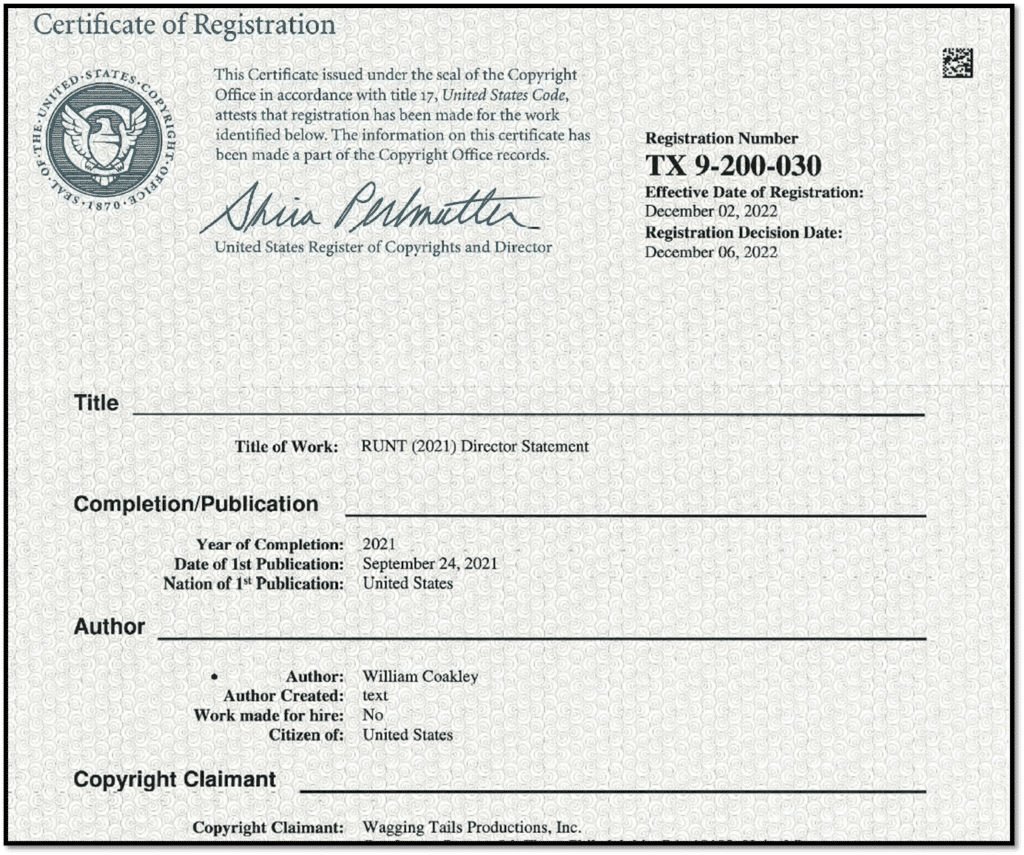
The Certificate of Engagement defines “Material” as including “all literary and artistic
material of every type and nature written, created, or furnished by Artist in connection with or relating to the Picture.” Wagging Tails argues that this definition encompasses Coakley’s Director’s Statements as well as “making of” or “behind-the-scenes” works “which discuss Defendant’s perspective on the substance, meaning, and message of the film and his take on what transpired during the creation of the Picture (however misguided his perspectives may be).”
The new materials likely won’t fall within the work-for-hire provision of the parties’ agreement, because they weren’t specially ordered or commissioned at the producer’s request. And while prospective copyright assignments can be valid, it’s not clear that this is what the parties intended here. The Certificate of Engagement specifically states that its purpose was to give the producer “a clean chain of title” in the film materials it planned to distribute—not to prevent accusations of misconduct from seeing the light of day.
Are Coakley’s Materials Infringing Derivative Works or Protected Fair Use?
Wagging Tails also claims that Coakley’s planned film project is “strikingly similar” to Runt, because it “uses the same characters to convey the same message about abuse. The minor differences are that the abuse occurs on a film set instead of a school, and with Boyce now deceased, Coakley himself takes on the role of vigilante.”
Putting aside that the film hasn’t been completed, and therefore no comparison of the works is possible, the suggestion that any Runt-related project will necessarily infringe Wagging Tails’ derivative work rights is overly simplistic. Documentaries or biopics that discuss other films often use elements from the underlying works for the purpose of commentary or criticism. But just because a documentary may be unauthorized or dramatized doesn’t mean it’s unlawful. Judges decide these cases by comparing the works at issue and applying traditional principles of copyright fair use. Projects which, in Wagging Tails’ words, “discuss Defendant’s perspective on the substance, meaning, and message of the film” are typically protected by courts, not enjoined.
For example, in 2014, a judge in the Southern District of New York dismissed a copyright and trademark infringement lawsuit against The Weinstein Co. over the studio’s biopic Lovelace, which recreated three scenes from the iconic 1972 porn film Deep Throat. The court held that the new film fell squarely within the fair use doctrine, as it transformed the original into something new by “adding a new, critical perspective on the life of Linda Lovelace and the production of Deep Throat.”
Similarly, in 2020 a Canadian court ordered Tommy Wiseau to pay nearly $700,000 to the makers of an unauthorized documentary about his cult film The Room, ruling that Wiseau thwarted the release of the documentary because it was unflattering. “In my view this action was brought for the improper purpose of preventing the release of a documentary disliked by Tommy Wiseau,” the judge wrote.
The Bottom Line
While Wagging Tails Productions v. Coakley raises fascinating legal issues involving the interplay between copyright law and free speech, the dispute itself is unfortunate and regrettable. Putting aside the truth of Coakley’s allegations, his alleged use of threats and intimidation to achieve legal outcomes is deplorable. At the same time, Wagging Tails’ invocation of copyright law to suppress lawful speech is antithetical to the purposes of copyright. In the words of Ninth Circuit Judge Margaret McKeown, “a trumped up copyright claim cannot justify censorship in the guise of authorship.”
I’ll post an update on the court’s rulings on Wagging Tails’ motions, but make no mistake: there won’t be any winners here.
As always, I’d love to know what you think. Drop me a line in the comments box below or @copyrightlately on social media.
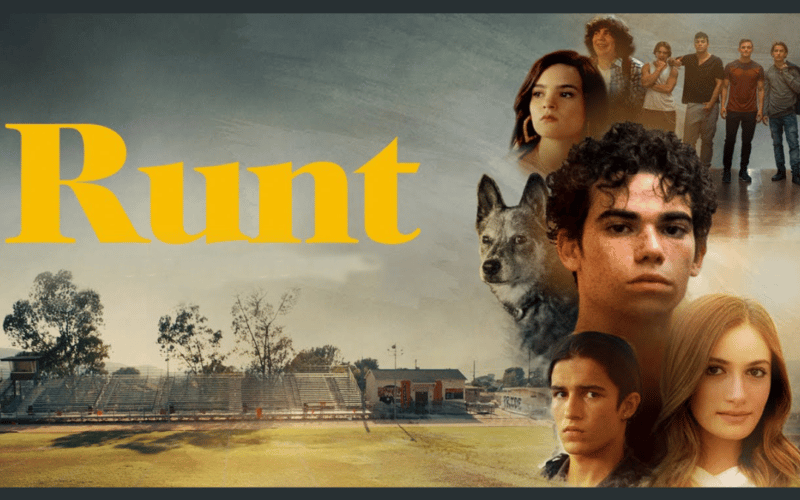




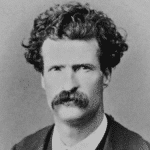
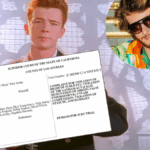
2 comments
I worked on this movie. Me and other crew members are waiting if the NDA gets thrown out before we can speak out and corroborate Coakley is telling the truth and the Bergers are lying. Your article was a very smart takedown of this nonsense lawsuit, We are trying to follow it closely. It has been seven months since the court date and I can’t find if it ever got decided. After this much time, does that mean the court is going to drop the case or does it just always take this long? What website could you point us to track the decision? Thanks.
I just checked the case docket on the court’s PACER website, and the motion for preliminary injunction and motion for default judgment are is still pending.